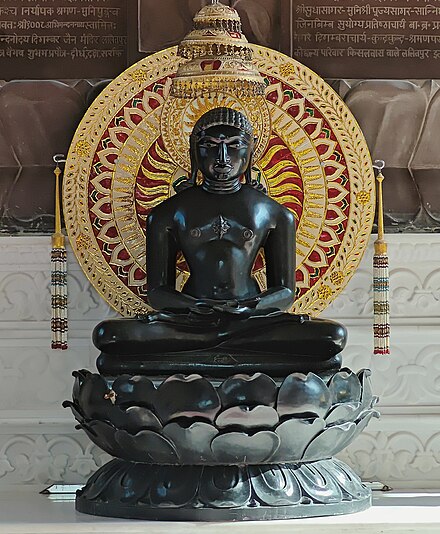Abhinandananatha, also known as Abhinandana Swami, is the fourth Tirthankara in Jainism. Tirthankaras are spiritual teachers who have attained enlightenment and guide others on the path to liberation (moksha). Here are some key points about Abhinandananatha:
Life and Significance:
Historical Context:
- Abhinandananatha is believed to have lived in ancient times, long before recorded history, during the third time cycle (Avasarpini) in Jain cosmology.
Parentage:
- He was born to King Samvara Raja and Queen Siddhartha Devi in Ayodhya. His birth is said to have brought prosperity and joy, which is reflected in his name, Abhinandana, meaning “to rejoice” or “to celebrate.”
Symbol and Color:
- Abhinandananatha’s symbol is the monkey, which signifies agility and alertness.
- His associated color is gold.
Enlightenment and Teachings:
- Abhinandananatha attained Kevala Jnana (omniscience) after a period of intense meditation and ascetic practices.
- As a Tirthankara, he re-established the Jain community and promulgated the principles of Jainism, including non-violence (ahimsa), truth (satya), non-stealing (asteya), celibacy (brahmacharya), and non-possession (aparigraha).
Nirvana:
- Abhinandananatha attained Nirvana at Shikharji, one of the most revered pilgrimage sites for Jains.
Iconography:
- Abhinandananatha is often depicted in statues and paintings in the lotus position (padmasana) or standing meditation posture (kayotsarga).
- His images typically include the emblem of a monkey, which helps in identifying him among other Tirthankaras.
Worship and Festivals:
- Abhinandananatha is worshipped by Jains, especially during religious festivals like Mahavir Jayanti, which celebrates the life of Mahavira but also honors all Tirthankaras.
- Special rituals, prayers, and offerings are made in his honor at Jain temples.
Temples:
- Numerous temples dedicated to Abhinandananatha can be found across India, including prominent ones in Rajasthan, Gujarat, and Karnataka. These temples are often elaborately decorated and serve as important centers for Jain worship and pilgrimage.
Philosophical Contributions:
- Abhinandananatha’s teachings emphasized the importance of self-discipline, non-attachment, and the pursuit of spiritual knowledge.
- He is considered a vital link in the spiritual lineage of Tirthankaras, maintaining and propagating the doctrines of Jainism.
Abhinandananatha’s life and teachings continue to inspire millions of Jains around the world, guiding them on the path of righteousness and spiritual liberation.



